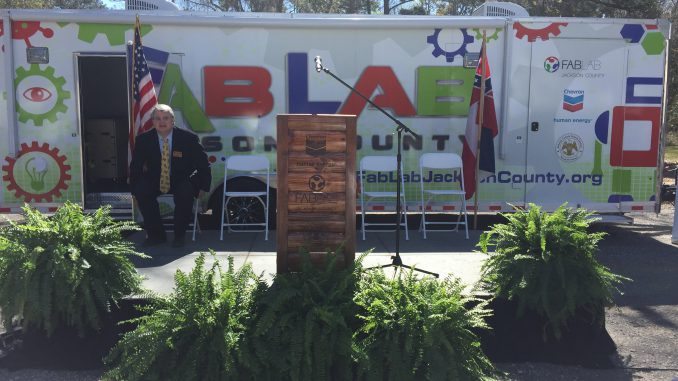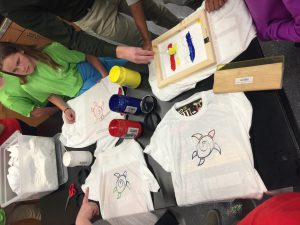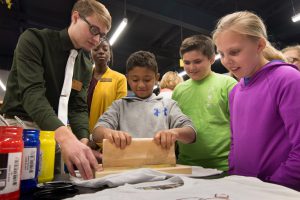
By Carl Smith
Connections Magazine
Before his students get to work on a project, Scott Beebe jokingly says he asks them two simple questions about their ideas: Is anybody going to die and will anything blow up?
“If they can safely say, ‘No,’ to those two things, then I say, ‘Try it,’” he said.
Beebe guides Jackson County School District (JCSD) students as they move their own ideas and classroom concepts to physical manifestations in high-tech, hands-on creation spaces known as fab labs (short for fabrication laboratories).
The fab labs represent a $1.2 million investment by Chevron and are comprised of two separate spaces: a mobile lab the district  received in 2017 and a building located in Vancleave that opened in March.
received in 2017 and a building located in Vancleave that opened in March.
Most students, Beebe said, graduate with theoretical knowledge of how things work, but rarely do they have experience in applying that knowledge in tangible, creative projects.
The fab labs allow students to do just that, he said, and applies the greatest teacher of all: trial and error.
“True education occurs through failure. I will do things in front of my students and in front of my kids that I do not know how to do, and I will do it on purpose so that they can watch me mess it up, watch me look at what was messed up and figure out how to do it correctly, and watch me go through that process,” he said.
“I think education [leaders are] learning there has to be a balance, and that’s basically in a nutshell what the fab labs are doing: They’re bringing back the balance between knowledge and application, and they’re bringing back that balance between knowing how to do something and actually being able to do it,” Beebe added. “Kids can come in here and bring their ideas to life. They can take what they’re learning in the classroom and see it applied through the fabrication process.”
THE LABS
The Chevron Corporation, in a partnership with the Fab Foundation, selected JCSD in 2017 as one of 10 recipients nationally of a $1 million grant funding the construction of a fab lab. Another $200,000 grant by the oil and energy giant allowed the district to purchase a mobile lab, which went into operation at the start of the 2017-2018 academic year.
While plans for the building were drawn up and construction crews broke ground on the project, the mobile lab and Beebe, the district’s fab lab manager, traveled from school to school, reaching more than 12,000 students in the first half of the academic year.
“The first day I go to a school, I hold an assembly where I talk to every kid at the school about what the fab lab is, why we need to learn about engineering, and the different jobs available. Then I spend the rest of the week in the classroom with about 100 kids throughout the day,” he said. “We actually design something and have a project where they have something when they’re done.”
Both creation spaces contain similar equipment that allow students to make almost anything. They can practice additive fabrication—when something is made by adding new pieces, layers, or materials—with 3-D printers or with the lab’s comprehensive electronics workbench, or use CNC routers and laser engravers to cut pieces of material in subtractive fabrication methods.
“NASA literally takes 3-D printers into space. If something breaks, there’s not a Walmart in space. They can download a file an engineer would send from NASA, 3-D print it, put the part in, and then have something to get them home, which is absolutely cool,” Beebe said. “There are also vinyl cutters—T-shirts and stickers—casting and moldings, so kids can learn how to build out of clay and wax; and sewing and embroidery machines, so kids can learn how to design their own clothes and logos.”
TEACHING IMPACT
Tying in traditional classroom theory to actual, tangible projects gives students more investment and ownership of their work, Beebe said, thereby increasing those projects’ importance.
“Teachers ask me all the time, ‘How am I supposed to use this in English class?…Now, let’s say you assign kids to write a poem, and they’re going to laser engrave it into a piece of wood to give to their mom for her birthday or Mother’s Day. Are they going to take that poem much more seriously now? Of course they are,” he explained. “It’s not about the technology then; it’s about the ownership they now have. The use of technology is just a bonus.”
Both students and teachers alike get excited to move from the traditional classroom to the fab lab, Beebe said. When the mobile fab lab rolls up at an elementary school and Beebe walks in to begin his assembly, he’s greeted by children shouting, “It’s Mr. Fab Lab!”
“I was told it couldn’t be done, but I literally had first-grade students, who didn’t know a right click from a left click, actually design coasters to give to their teachers at school. It was really cool because people asked if I had a template or if I did this or that, and I said, ‘No.’ I just stood in front of the classroom, told them how to do it, and they did it,” Beebe said. “It’s neat to watch them interact with technology. Kids aren’t scared of it, and that’s the coolest part. Adults are scared of technology; they don’t want to mess anything up.”
To entice teachers, Beebe held a Christmas party in which he invited faculty members to come in and build gifts for family members as a way to familiarize themselves with the mobile fab lab and its equipment.
“These teachers come in, and they’re excited about doing this because it’s new to them, too,” he said. “You have to get them involved, or they don’t see what can be done with [the fab lab].”
The lab has also provided Beebe with a newfound appreciation of fabrication and some new skills.
“I’ve done so much in the last six months that I’ve never done in my life,” he said. “I’ve learned how to screen print, and I came up with my own process. It’s not what they do in stores, but it works. It turned out really neat.”
Beebe is the “perfect fit” as the fab lab instructor, said Jackson County CTE Director Jerry Morgan, because of his ability to relate to students and boost their curiosity.
“He is the only teacher I have ever seen that is certified to teach both kindergarten and physics. This shows you his range of teaching students,” Morgan said. “Mr. Beebe has brought enthusiasm and dedication to this initiative in our community. The JCSD is proud to be the first fab lab in the state and is proud to be raising the standard for our students and community. A county that has already given a Grammy Award-winning songwriter, Paul Overstreet, and Mr. Pirate himself, Jimmy Buffet, will continue to promote innovation and the creation of new STEAM [science, technology, engineering, arts, and mathematics] ideas.”
STUDENT SKILLS
Both Beebe and Chevron officials hope the fab lab provides a direct impact on the local economy by giving students emerging into the local job market the skills they need to find and hold careers immediately after graduating high school.
Locally, Beebe said, businesses like Chevron, NASA, Ingalls Shipbuilding, and area health care providers comprise a major part of the job market. Those industries, he said, are looking to establish a pipeline of new workers graduating with the skillsets needed to take on their work.
“We are excited to partner with Fab Foundation and the Jackson County School District to open Mississippi’s first state-of-the-art fab lab,” said Chris Cavote, Chevron Pascagoula Refinery general manager. “Education and economic development are linked, and it is essential that our future workforce be prepared to take advantage of the opportunities they’ll have before them.”
“Without Chevron, none of this would be possible,” Beebe added. “When you invest $1.2 million back into the community, you’re doing it for a reason. They know this is important.”
While students can learn specific skills—soldering resisters and wire to electronics boards, for example—at the fab lab, Beebe said the spaces’ biggest indirect impact is developing the soft skills in students that employers look for in new hires.
Beebe involves the students in various ways to help boost their confidence, communication, and experience. For example, St. Martin High School senior Taylor Barnes wrote a grant under Beebe’s supervision to Ingalls Shipbuilding, and the program received $5,000 from the effort. Additionally, a group of seniors, dubbed the Fab Lab Student Ambassadors, assist Beebe in teaching younger children one week a month.
“People always ask, ‘What can you make?’ If all we’re doing is worrying about what we’re making, then we need to shut this down. At the end of the day, it should be about what are they learning, how they are becoming more interested, and how they are becoming more involved in what’s going on,” Beebe said. “In reality, if you can get somebody used to technology, then that’s going to translate into any job you do by the time some of these kids graduate. This is all about teaching confidence, being willing to keep tying when you mess up, being accepting that everything is not going to be perfect the first time you try it, and that you won’t have all the answers at first but you can figure them out on your own.”
For more about the JCSD Fab Lab, visit fablabjacksoncounty.org.
